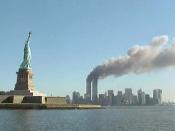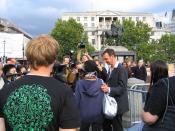Movies provide viewers with an escape from realism, and let their imaginations take hold for a while, bringing a sense of independence in a country that seems less and less independent each day. Depressed by the attacks, Americans sought to get away at movie theaters and video stores across the country. The weekend following September 11, 2001, movie attendance was up 44% from the past year. When Wheeler Winston Dixon compiled his Introduction to Film and Television After 9/11, it was exactly one year after the attacks on the World Trade Center and the Pentagon. The rights of Americans have altered dramatically, and the culture seems to be taking a shift into looking more towards their own personal future and trying to evaporate the past.
The first year after the attacks brought about many documentaries and films interpreting the events. Over time, Dixon feels that the shock value of these images and scenes seems to be fading away.
He compares 9/11 to other horrific events such as the Holocaust, the Hindenburg disaster, and Pearl Harbor. These events now seem to be seen just as images and do not extract the emotion that people had when the events first came into play. Dixon believes this loss of shock is due to the constant repetition of the images and scenes. When the media is constantly shoving terrifying images in the public's eye, they grow accustomed to it over time and do not react in the way they did in the beginning. It is like seeing a scary movie for the fifth time. The viewer knows what is going to happen next, and does not jump or scream anymore. Americans see certain images now as icons and symbols of 9/11, and do not sense the reality of each image anymore.
The people...


